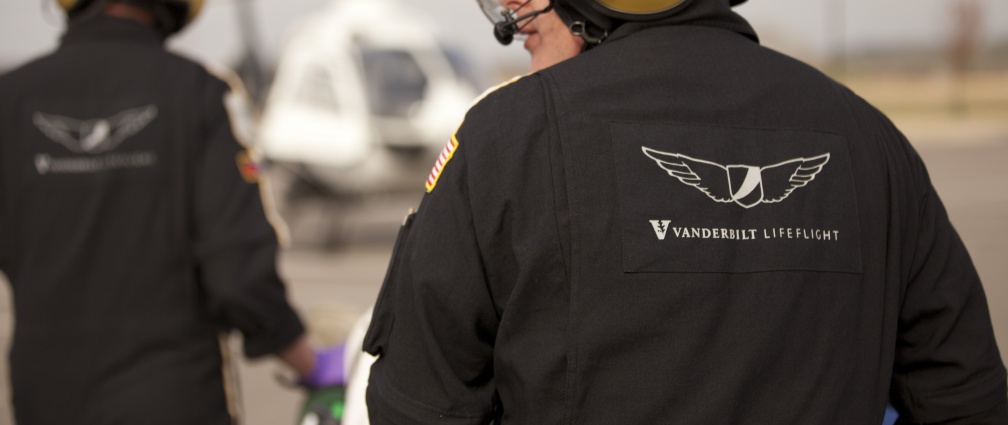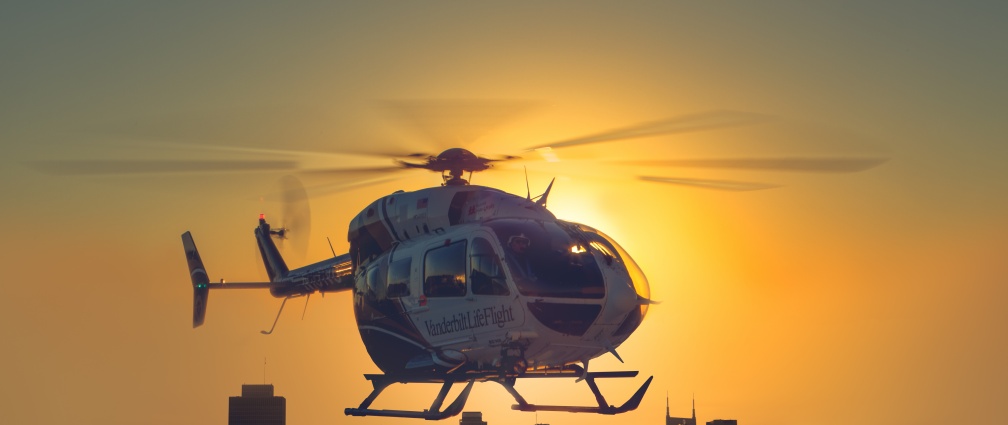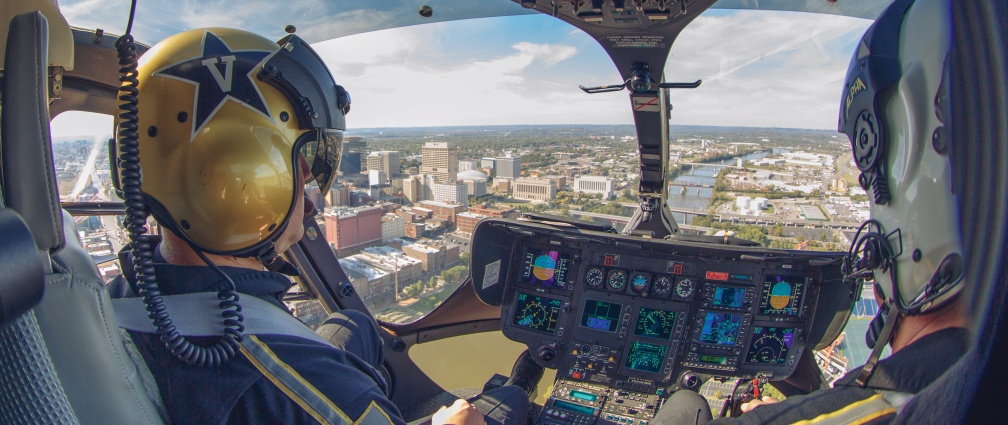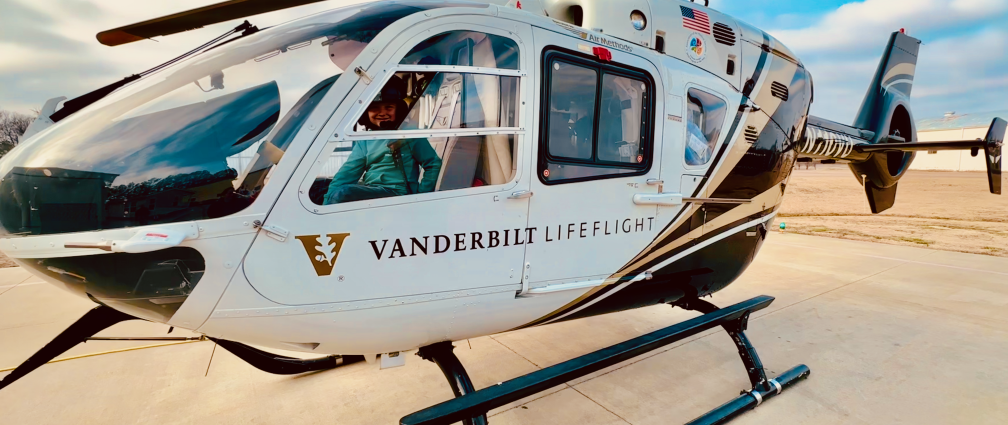Vanderbilt LifeFlight offers a ride-along program to system activators, including 911 communicators, EMTs, AEMTs, paramedics, nurses, respiratory therapists, and physicians working within the LifeFlight service area as an opportunity to see firsthand our air medical operations. Participants will complete a safety briefing upon arrival at the base and serve as an observer on flights. Unfortunately, the ride along program is not open to students who are not system activators due to the large demand.
The Ride-Along (RAL) program is designed to provide a learning experience for employees in fields related to Emergency Services, providing an opportunity for emergency service providers to become knowledgeable about safe helicopter operations and appropriate flight criteria. There are no guarantees that a participant may actually get a flight while participating. Weather, new employee orientation, and other factors may prevent a participant from getting a particular date requested.
A ride along safety orientation must be completed prior to scheduling your eight-hour flight shift. Please allow at least one hour to complete the orientation.
Applications for the 2025 - 2026 season are currently closed.
-
The following are requirements to ride along:
- You must be 18 years of age or older
- You must certify that you are compliant with measles, mumps, rubella, varicella, Tdap, and hepatitis B. If your ride-a-long is scheduled any day between October 1 and April 1, you must also certify that you are compliant with annual influenza immunization. You will agree to follow all VUMC guidelines regarding masking and social distancing.
- You must be a 911 communicator, EMT, AEMT, EMT-P, CCP, RT, RN, or MD from the Vanderbilt LifeFlight service area, currently working in EMS, ER, ICU or Public Safety Communications with the ability to activate and request the helicopter service.
- If you have issues with motion sickness, claustrophobia or vertigo, we suggest that you not participate.
- Applicants must weigh 220 pounds or less and have a waist size 44 inches or less to be properly secured in the seat belts. A weigh-in will be performed the morning of your ride along at the base. Riders over 220 pounds at the weigh-in may not be able to complete their ride along.
- Due to the large number of requests, students are not eligible. This includes ER nurse residents, nursing students and paramedic students. Emergency Medicine (EM) residents and nurse practitioner students are eligible to complete a RAL. EM residents may be scheduled off season during their EMS month. If they do not get a transport then they can be scheduled again during the normal ride along season.
- Based on program availability, participants may be rescheduled for an additional RAL if there was not a transport on the initially scheduled day
- Individuals may apply annually.
- Applicants should be reasonably fit and be able to swiftly exit the aircraft without assistance. The physical requirements are, at a minimum, what is necessary to sit next to the emergency exit door on a commercial airliner.
- For worker’s compensation reasons, all Vanderbilt employees are “on the clock” while participating in the RAL program. These hours are paid by the applicant’s home department budget. Since these additional hours may create overtime, the applicant needs approval from their department manager.
-
- Professional dress is required. Fire, EMS, and law enforcement personnel may wear their uniforms. All other ride along participants will be required to wear durable khaki, black, or navy- blue pants and a solid-colored polo type shirt. Jeans and scrubs are not appropriate attire for a ride along shift. Please dress appropriately for the weather. It is not uncommon to spend extended periods of time out in the elements.
- Boots are the preferred footwear. However, other styles are acceptable so long as they have a non-slip tread and provide adequate foot protection. Open toe/back shoes such as sandals and clogs are not allowed.
- For cold weather ride along shifts please bring the following with you: hat, gloves, boots, warm jackets, heavy socks, and long underwear.
- All Ride Along participants wear the provided “LifeFlight Observer” vest throughout all phases of a transport.
-
Ride along day is typically 9 a.m. to 5 p.m regardless of base or rider.
- There are rare occasions your shift may need to be cancelled or re-scheduled, so please call the Vanderbilt LifeFlight Communications Center prior to driving to the base on the morning of your ride along shift.
- Riders call the Office of Emergency Communications between 8am to 8:15am the morning of their ride along day and request to be transferred to base to confirm with the crew.
- If you are unable to keep your ride along shift we ask that you call the Vanderbilt LifeFlight Communications Center as soon as possible to cancel prior to the start of the shift. If you are considered a “no call/no show” you will not be re-scheduled.
- Please arrive well rested the day of your scheduled ride along shift, and don’t plan on working the night before. If the flight crew feels you are too fatigued to safely fly, you will be sent home.
-
- A busy day may offer little or no time for meals, drinks, or snacks. You may also encounter turbulences, vibration, noise and extreme hot or cold. If you have a medical condition that may make it difficult for you to perform in these conditions please document that on your ride along application form.
- Make sure you eat breakfast. Flying on an empty stomach will increase your chance of becoming airsick.
- Bring something to eat and drink throughout the day. The base has a refrigerator and a kitchen area that you are welcome to use.
- Bring money with you so in the case of back to back flights you may purchase drinks or food items.
- Please bring something to do during idle time such as homework, book to read etc.
- Due to the unpredictability of calls, we are unable to guarantee that you will return to the base by any certain time. Please plan your evening accordingly.
- There is a rare chance due to weight and balance of the aircraft; you may be left behind at a scene or at an outlying facility. We will make every effort to keep you safe and arrange for your pick up as quickly as possible. If we are aware of a weight issue before leaving the base, you will be left behind.
- Cell phones must be in airplane mode at all times while the aircraft is running. You are free to take pictures while in the air. However due to patient privacy restrictions, photography is prohibited once on scene/bedside and while a patient is in the aircraft.
- You must carry a valid driver’s license or an official ID with you at all times.
-
Applications for the 2025 - 2026 season are closed.
-
Operation Tail Watch is LifeFlight's helicopter use and safety class. The class covers helicopter use, patient criteria, LZ selection and safety, and helicopter safety. The online class consist of a powerpoint presentation including a short video to put it all together. Following the presentation you will be asked to take a short quiz. You will be required to fill out an information form with your contact information. Once submitted you will receive .1 CEU within a few weeks via email. CEUs will only be awarded to candidates within the Vanderbilt LifeFlight service area. Just click on the link below to begin.
View the Operation Tail Watch online training here.This takes you to a registration page on the VUMC RedCap site, and then once you register, the online course takes about 60 minutes to complete.
Once you complete the course, you will be asked to take a test, and then fill out an evaluation, and then awarded your certificate.




